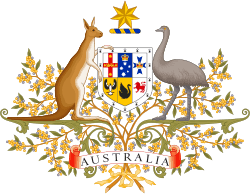Fair Work Ombudsman
|
| |
| Agency overview | |
|---|---|
| Formed | 1 July 2009[1] |
| Employees | 800+ |
| Minister responsible | |
| Agency executive |
|
| Website |
www |
The Office of the Fair Work Ombudsman, or more commonly, the Fair Work Ombudsman (FWO), is an independent statutory agency of the Government of Australia that serves as the central point of contact for free advice and information on the Australian national workplace relations system. The Office of the Fair Work Ombudsman also investigates workplace complaints and enforces compliance with national workplace laws.
The head of the Office of the Fair Work Ombudsman is the Fair Work Ombudsman, currently Sandra Parker, who reports to the Minister for Employment, currently Senator the Hon. Michaelia Cash.
Operational activities
Office of the Fair Work Ombudsman achieves its functions by:
- offering people accurate and timely information about Australia’s workplace relations system
- educating people working in Australia about fair work practices, rights and obligations
- investigating complaints or suspected contraventions of workplace laws, awards and agreements
- litigating to enforce workplace laws and deter people from doing wrong in the community
- building strong and effective relationships with industry, unions and other stakeholders.
The Office of the Fair Work Ombudsman, along with Fair Work Australia—the national workplace relations tribunal—was created in 2009 by the Fair Work Act 2009. The Office of the Fair Work Ombudsman works with Fair Work Australia with the objective to ensure the services are integrated, timely, relevant and accessible to all Australians.
The Office of the Fair Work Ombudsman
The Office of the Fair Work Ombudsman consists of the Fair Work Ombudsman, supporting staff and Fair Work Inspectors who are all focused on serving the needs of everyone covered by the Australian workplace system. The Office of the Fair Work Ombudsman has offices located in Sydney, Melbourne, Canberra, Brisbane, Adelaide, Darwin, Perth and many regional locations. There are also state partner offices in Queensland, South Australia and New South Wales that deliver services that would normally be delivered by the Office of the Fair Work Ombudsman.
Functions
The functions of the Office of the Fair Work Ombudsman, as set out in the Fair Work Act 2009, include:
Education & advice
The Office of the Fair Work Ombudsman offers employers and employees free information and advice on pay, conditions, and workplace rights and obligations under the national workplace relations system. Information and guidance material in the form of fact sheets, templates and Best Practice Guides, is provided on the Omdudsman's website. FWO has also developed a suite of online tools for public use, including trainee wage calculators, Pay Check Plus and the Leave calculator. The Office of the Fair Work Ombudsman operates the Fair Work Infoline for workplace relations queries on 13 13 94. The Infoline is open Monday to Friday from 8:00 am – 6:00 pm (business hours in Australia) across all Australian states.
Audits & Campaigns
The Fair Work Ombudsman conducts targeted campaigns and audits. Through targeted campaigns, the Ombudsman aims to inform employers in a specific industry of their obligations, and ensure that they understand and comply with Commonwealth workplace laws. Campaigns can be national, state-based or regional.[2]
An audit is where Fair Work Inspectors check an employer’s records to make sure they comply with Commonwealth workplace laws. Sometimes, FWO undertakes an audit or a series of audits in response to a complaint or information given by an industry association, a government minister, the media or another source.
Complaints
Those in the national workplace relations system can make a complaint to FWO regarding underpayment of wages, conditions (such as annual leave), workplace rights and discrimination in the workplace.
Next steps
The Office of the Fair Work Ombudsman will make a decision about the best course of action to resolve the complaint. FWO might decide:
- that the matter is outside of their jurisdiction and refer you somewhere else
- that there hasn’t been a breach of Commonwealth workplace laws
- that mediation is the best way to resolve the issues
- to conduct a formal investigation
- to conduct an audit.
An investigation looks at employment records and documents to find out the facts of a workplace compliant and to decide if relevant parties have complied with Commonwealth workplace laws.
There are a number of stages to an investigation. However, it will depend on what a Fair Work Inspector finds during the first stages as to whether the latter stages need to happen. The three stages are:
- Assisted Voluntary Resolution (AVR)
- Full investigation and compliance
- Enforcement
References
- ↑ CA 9305: Fair Work Ombudsman, National Archives of Australia, retrieved 1 May 2016
- ↑ Fair Work Ombudsman, Audits and campaigns, archived from the original on 22 February 2014

